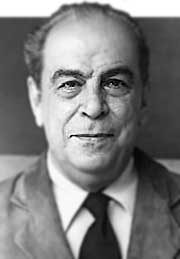Rómulo Gallegos
 Rómulo Gallegos was a Venezuelan novelist and politician; who is considered to be the most important Venezuelan novelist of the 20th century and one of the greatest Latin American literati of all time. He served as President of Venezuela in 1948 for a mere nine months, had become the first Venezuelan president of the twentieth century chosen directly, secretly and universally by the people; and It has been President who has obtained the highest percentage of votes in his favor in elections held in the country, with more than 80% of the total votes. However, his separation from power was due to the coup of 1948, led by Carlos Delgado Chalbaud.
Rómulo Gallegos was a Venezuelan novelist and politician; who is considered to be the most important Venezuelan novelist of the 20th century and one of the greatest Latin American literati of all time. He served as President of Venezuela in 1948 for a mere nine months, had become the first Venezuelan president of the twentieth century chosen directly, secretly and universally by the people; and It has been President who has obtained the highest percentage of votes in his favor in elections held in the country, with more than 80% of the total votes. However, his separation from power was due to the coup of 1948, led by Carlos Delgado Chalbaud.
The beginning of Rómulo Gallegos as a writer is associated with the theater; Together with his colleagues in the magazine La Alborada he shared the passion for this genre; He even wrote several works, such as "Los Ídolos" (1909) and "El Motor" (1910).
In his beginnings as a narrator, Rómulo Gallegos published Los Aventureros (Caracas, 1913), and a collection of stories. Other stories are compiled in "La Rebelión y otros cuentos" (Caracas, 1946),and "La Doncella y El Último Patriota" (Mexico, 1957). His period as a storyteller covers from's 1913 to 1919, although other stories will be published in 1922.
In his works he will always maintain realism, where are divided three fundamental thematic:
Those of criticism of customs.
those of Creole ambient where the antinomy raises civilization and barbarism.
And those that describe passions, imbalances and abnormalities.
His novels reflect his interest in the peasant life of the Venezuelan.
In 1927 he travels to witness the Venezuelan plains and thus document for his next novel, the result would be Doña Bárbara published in 1929; Doña Bárbara represents that cruel Venezuela, insensitive to corruption, treason, despotism, lack of freedom, latifundismo, injustice and witchcraft; but in the melodrama it is shown that in reality there was also a good society that loves; they suffer and wait to fight against the rampant dictatorship of that time, gente representada por Santos Luzardo. This novel would lead him to public recognition, it was the most successful of his works.
The dictator Juan Vicente Gómez to see his prestige appointed him in 1931 senator for the state of Apure, but his democratic convictions made him renounce the position and expatriate, exiling himself in 1931 to New York.
He began his political career at an early age militating in opposition to the dictator Juan Vicente Gómez. In 1937 Gallegos is elected deputy and will gradually abandon literature to devote himself to politics.
When General López Contreras assumes the presidency in 1936, a reformist era begins in Venezuela and Gallegos was appointed Minister of Public Instruction, office that tried to reform, even going so far as to change its name to that of the Ministry of National Education; however his efforts to carry out a deep school reform were hampered by a National Congress largely dominated by Gomecism and he was forced to resign.
In 1945 he participated in the military coup that brought Rómulo Betancourt to power as provisional president of the country, and it was in the first free elections of Venezuela of 1947 when he was elected president of the nation through universal suffrage, direct and secret.
However, in November of the same year, the army revolted in the 1948 coup d'état under the command of a military junta headed by Carlos Delgado Chalbaud and dismissed him from his post; so the democratic experience dies. Exiled again, he goes to Cuba and then to Mexico in 1949, and lives in the Mexican capital and in the city of Morelia.
Rómulo Gallegos returned to his country when he was released from the dictatorship of Marcos Pérez Jiménez in 1958, but he would no longer devote himself to politics. In 1960 he was elected Commissioner and first President of the newly created Inter-American Commission on Human Rights, OAS organ in Washington, DC, position he held until 1963.
Since then he lived in Caracas until the day of his death; he died in the city of Caracas in 1969, at 84 years of age. On May 3, 1994, President Rafael Caldera had decreed the National Pantheon honors for Gallegos, , but it was never buried because the last will of the writer was to rest by the grave of his wife Teotiste, in the south wing of the General Cemetery of the South.